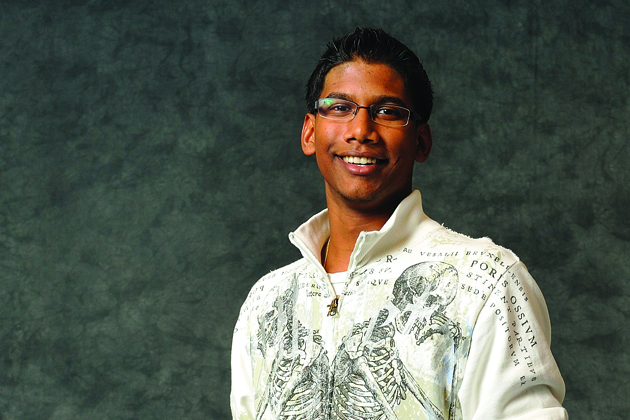
A biomedical engineering major transitioning from UConn’s Waterbury campus to Storrs this fall is intent on changing the world.
The long-term goal of Jerry Sooklall ’15 (ENG), who earned a UConn Presidential Scholarship, is to design a prosthetic that incorporates the nervous system so that it functions like a natural limb.
“Some prosthetics already connect to the brain but, for example, only two or three fingers move,” Sooklall says. “I want to invent a prosthetic that acts like a real hand. It will take research, testing how the nervous system works and finding a light enough material for the brain to move. I believe this is a way of not only changing the world but helping people in general.”
Sooklall’s motivation for invention is his grandfather, whose leg was cut off at the knee from gangrene, resulting in hospitalization for most of his life. “That triggered something—maybe subliminally —in me, but it just came to me that I like engineering, and biology is fascinating,” he says. “So studying biomedical engineering is a way I can help people not miss out on life and help disabled people not be profiled as different.”
Born in Guyana, Sooklall lived there until he was 3 years old. He earned a certificate in computer-aided drafting and design at Kaynor Technical High School in Waterbury and was student council president. The class valedictorian, Sooklall focused his graduation speech on a co-ed teen leadership class he characterized as the best part of high school. “A lot of kids carry a lot of burdens,” Sooklall says. “We agreed that ‘what’s said in this classroom stays in here,’ which helped people open up, accept each other’s flaws, and connect. We poured ourselves into that.”
He also poured himself into making a decision regarding where to continue his education. “I had to choose between four other schools, and UConn seemed best,” Sooklall says.
Accepted to the Storrs campus within the School of Engineering, Sooklall began his studies at the regional campus because he thought it would be less stressful. He also eased his transition by participating in the Student Support Services program, six weeks of summer school designed to acquaint incoming students with University coursework. “I earned seven credits and got an idea of how to manage the workload and myself,” Sooklall says. “I’ve seen a lot of kids not doing what they’re supposed to do, playing pool instead of getting down to it. I know I can play pool afterwards.”
With his turbocharged ambitions, having time management under control is a necessity. “I want to see new places and study biomedical engineering abroad my junior year, which is offered in Hong Kong, Australia, and New Zealand,” Sooklall says.
He then plans to apply to UConn’s five-year biomedical engineering BS and MS degree program and work in an internship along the way.
But first—“I really want to join the student Biomedical Engineering Society,” Sooklall says. “I’m all excited to be coming to Storrs.”



